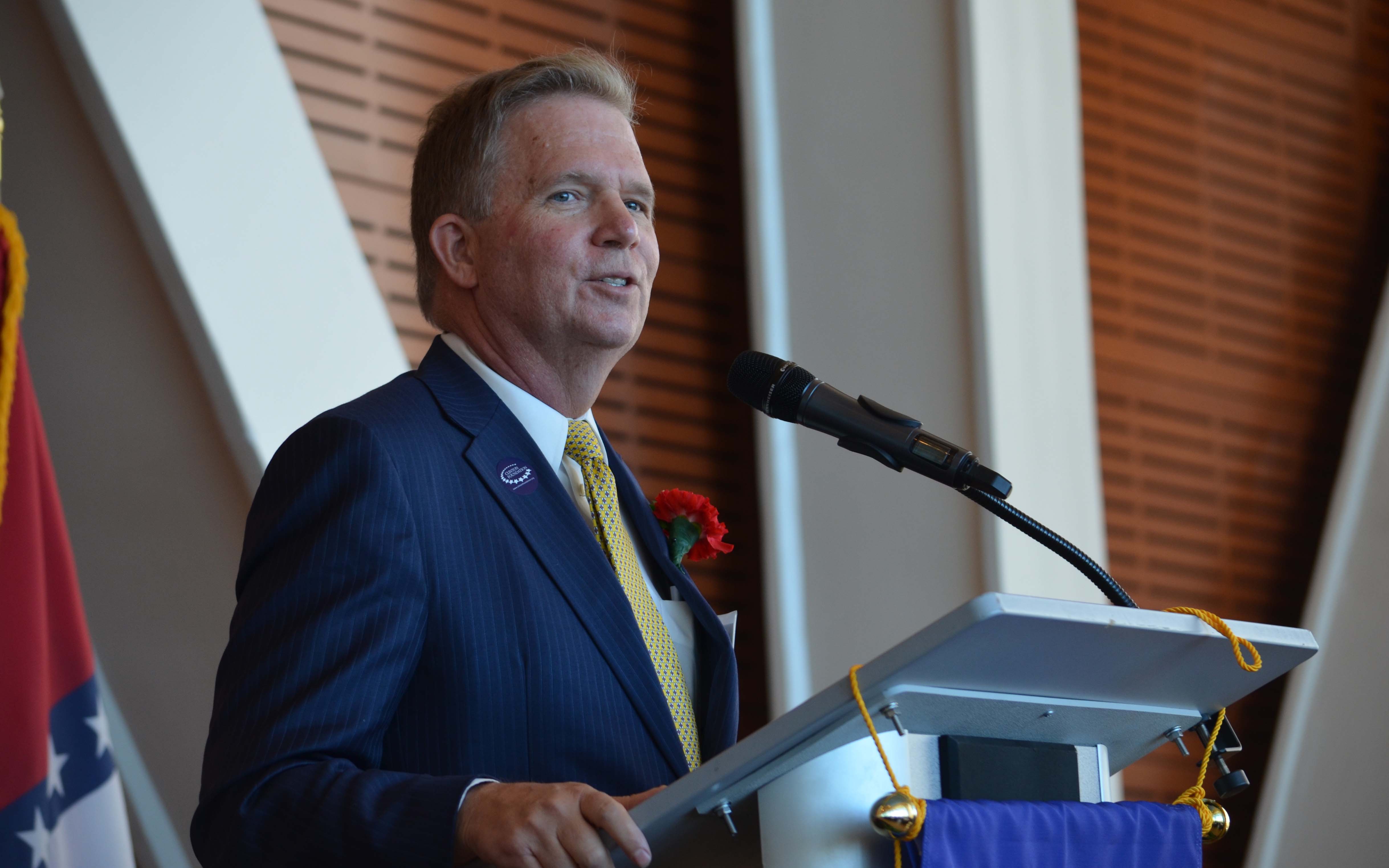Veteran recalls anxious times in Iraq
November 23-29, 2015
By Jay Edwards
Perhaps the best way to get a true feel for what it’s like to serve your country in the military is to listen to a veteran tell stories of their own experiences.
That is what members and guests of the Pulaski County Bar Association got to do on Nov. 13 at the Clinton Library.
Colonel John C. Edwards, US Army Reserve (Retired) comes from a line of soldiers. His great-grandfather, Norman Hobgood, served in the Spanish-American War, and was recognized during the latter years of his life as the oldest American veteran.
In October of 2003, the 39th Infantry Brigade Combat Team was deployed to Iraq. Edwards had been the Staff Judge Advocate for the 39th for two years, where he served as senior military legal advisor. By April of 2004, he, along with 4200 soldiers, was in Baghdad.
It was a challenging time, one of the most violent of the war. In fact, on his first night there he narrowly escaped death when his convoy was attacked.
One day, after he’d been there just a few weeks, one of his men came and got him, saying, “Colonel, there’s a riot at the front gate.”
When Edwards arrived he estimated there were 300 angry Iraqis, protesting loudly just outside the gate.
Through an interpreter he was able to convince the crowd to take him to their leader, who told Edwards that the problem was the two Iraqi women the Americans were holding in a cell.
Edwards asked for more information.
What he found was that the previous unit in Iraq had actually rescued the two women, but had placed them in an Abu Ghraib prison.
After doing some checking Edwards found out that there was no reason the women should be held and they were soon released.
Problem solved, or so he thought. A couple of weeks later he was summoned to the front gate again where he met a woman and two large men.
The woman spoke English and told the colonel that she was one of the women who had been released.
She said, “I have a serious problem. When I was taken prisoner, my father had gone to a local Shaikh and told him that if he could get me released, as payment, my father would give him my Mercedes.
When my father heard I was being released, he drove my car to the Shaikh, and gave it to him. Later, when he found out the Shaikh had nothing to do with me being freed, my father went back to the Shaikh to get my car back, but the Shaikh refused. Then my father came to me and said, ‘I am going to get a 9mm pistol and blow this guy’s head off.’
“I told him, ‘Well before you do that, let me go talk to the Americans.’”
Edwards had been listening and taking notes and he said when she told him who the Shaikh was, he could feel the blood run out of his face.
“He wasn’t just any Shaikh, but the president of the Baghdad Council. And he was someone we needed very much alive at that time.”
Edwards went to General Ron Chastain with the dilemma, who said, “Well, Edwards, you will just have to figure this out.”
He knew he had another problem and that was his rank, because the Iraqis are extremely rank conscientious.
“This Shaikh was used to dealing with one and two star generals and full colonels,” Edwards said, “I was a lieutenant colonel, and I knew that if things went south it would probably go bad for the Shaikh.
As the meeting drew closer, Edwards still was not sure how to overcome the challenge.
He arrived at the meeting with his two interpreters, one American and one local, just before the Shaikh and his entourage got there.
He told the local interpreter to tell the Shaikh his exact words, and that once he began he would not hesitate or take his eyes off the Shaikh.
Edwards said after some small talk it was time to get down to business and he said, “Your eminence, I know what you are thinking. You are wondering why a man of your greatness is meeting with a mere lieutenant colonel. But there is something you must know, I am not the normal lieutenant colonel in the American army. I am the lieutenant colonel they save to meet with only the most important people like you. But I am a stranger in your country and so I must prove to you that I speak the truth.”
At that moment Edwards pulled out a photograph of himself and President Clinton in the Oval Office. The Shaikh looked down at the photo and then looked back up at Edwards face before again looking back at the picture on the table. He took his finger and pointed down, tapping on the photo two or three times and saying, “Ahh, the Clinton, the Clinton.” Edwards nodded back.
Two hours later the woman had her Mercedes back and her father was satisfied.
When Edwards returned to the United States he saw President Clinton and told him the story. “He seemed fairly enthralled by it and at last said, ‘John, just think, I helped save a life in Iraq.’”
“Yes Mr. President, you did.”
The Daily Record wishes to thank all those who have served and are currently serving in our military.



